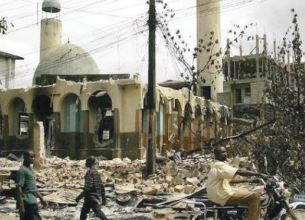Katsina Massacre: ‘We were in 2nd rak’ah when gunfires went up, air exploded – Survivor

By Ogalah Ibrahim
At dawn, the air in Malumfashi is usually thick with soft whispers of prayer, and the faint crow of roosters. But on the morning of 19 August when the faithful had gathered for Fajr at the mosque in Unguwan Mantau, the serene atmosphere was ruptured by gunfire instead of the rhythm of voices rising in devotion.
Read Also: Katsina massacre: Death toll rises to 50
“I remember the sound of the muezzin calling us in,” says Malam Kabir, “We were in the second rak’ah when I heard the motorcycles. Then—gunfire. It was like the air itself exploded,” he said, his gaze fixed somewhere far away.
The gunmen stormed the mosque, cutting through rows of worshippers. No fewer than 30 men were killed, most before they had the chance to attempt an escape. The attackers, described locally as “bandits”, left behind blood-stained mats, torn sandals, and the echo of unanswered prayers.
‘When I close my eyes, I see their faces’
Inside the mosque, fear turned quickly to chaos. Survivors recall screams muffled by gunfire, people stumbling in the darkness, the air filling with dust and acrid gun smoke.
“I saw my neighbour lying face down right in front of me. He didn’t move,” says Kabir. “We grew up together. I feel for his family. I had to crawl under bodies to escape.”
When the bandits left, the silence was heavier than the violence itself. “I have not prayed inside a mosque since then. How can I kneel where blood was spilled? Every time I close my eyes, I see their faces.”
The mosque was our refuge
For Malam Umar, a religious leader from the area, the attack was not just on worshippers but also on the heart of the community.
“The mosque was our gathering place, our school, our refuge,” he says. “To attack it is to say: you have no right to peace, not even with your God.”
Leading a traumatised flock has become their heaviest burden. Congregants ask why God allowed such horror. “I tell them,” he says softly, “‘It is not God who failed you. It is man. Evil is the absence of God in their hearts.’”
On whether forgiveness is possible, Umar pauses. “We preach forgiveness, yes. But forgiveness without justice is another wound. What we need now is not just prayers but also protection.”
A widow whose husband was among the dead, her face thick with wailing, said she last saw him at the door, shortly before heading out for Fajr. “I told him to be quick, that I have something to share with him. Those were my last words to him.”
She speaks of her loss with an anger sharpened by betrayal. “The bandits killed him, yes. But the government killed him too, by leaving us defenceless. Who protects the poor in these villages? Nobody.”
For her younger children, she struggles to explain. “I tell them your Daddy is with God. But when they ask if they too will be safe in the mosque, I have no answer.”
We bury, they forget
In Mantau, families return each morning to sweep the mosque floor, to wash away what cannot be forgotten. But residents say promises of protection fade as quickly as the footprints of the attackers. “We bury, they forget,” says one bitterly.
The people of Unguwan Mantau are left with prayers, scars, and a question echoing louder than the gunfire that morning: how long can faith survive when even the house of God offers no sanctuary?
‘We heard too late’
Local security officials admit their response was delayed. “The first alert reached us after the attack was already under way,” says a vigilante who does not wish to be named. “By the time our men arrived, the attackers had fled into the bush.”
The challenges, he says, are huge: too few men, outdated equipment, and a landscape that gives the bandits easy cover. “They ride motorcycles, they know the terrain, and the communities are isolated. We cannot be everywhere at once.”
Asked about trust, the vigilante sighs. “The people say we fail them, and sometimes we do. But we also bury our own in this fight. We need them to see us as allies, not strangers.”
Meanwhile, the Chief of Defence Staff, General Christopher Musa, has expressed concern over renewed violence in Katsina and other parts of the North West.
Speaking on Channels Television, General Musa said the military has intensified operations nationwide, but admitted that killings in the region, including the recent massacre of worshippers in Malumfashi, remain disturbing.
Security analysts say the attack is part of a broader pattern that has transformed Nigeria’s northwest into one of the most dangerous rural zones in Africa. They claimed the systematic campaigns of violence is rooted in poverty, weak governance, and the collapse of traditional authority structures.
The post Katsina Massacre: ‘We were in 2nd rak’ah when gunfires went up, air exploded – Survivor appeared first on Vanguard News.







